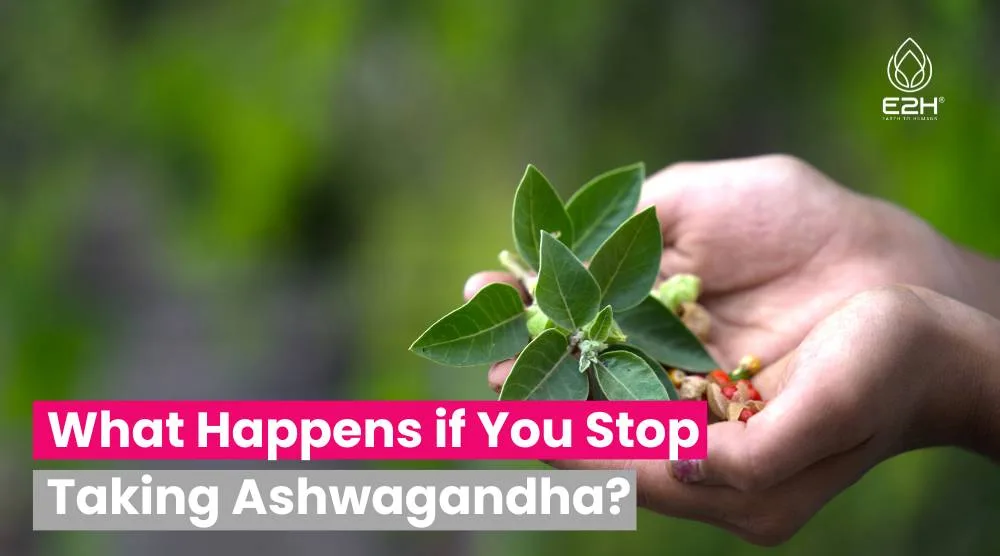What Happens If You Stop Taking Ashwagandha: If you stop taking Ashwagandha, you may experience mild symptoms like increased stress, sleep disturbances, and mood fluctuations. These effects are usually temporary as your body adjusts.
Keep reading to understand how your body might react and what you can expect during this transition. It’s important to know what changes might occur and how to manage them effectively.
Is Ashwagandha Withdrawal A Real Concern Or Just A Myth?
Ashwagandha withdrawal is a topic of debate among experts. While some individuals report experiencing withdrawal symptoms after discontinuing its use, scientific research on this aspect is limited. Ashwagandha, known for its adaptogenic properties, helps the body manage stress and anxiety.
When stopped, some people may experience a resurgence of these symptoms, which can be mistaken for withdrawal. However, these symptoms are generally mild and not as intense as withdrawal symptoms associated with certain pharmaceutical drugs. It’s important to differentiate between the body readjusting to the absence of the herb and actual withdrawal.

What Changes Occur In The Body If You Stop Taking Ashwagandha?
- Resurgence of Stress and Anxiety: The body may experience increased stress levels as it adjusts to the absence of Ashwagandha’s calming effects.
- Sleep Disturbances: Some individuals might face difficulties in sleeping or changes in their sleep patterns.
- Mood Fluctuations: There can be noticeable shifts in mood, possibly due to changes in stress hormone levels.
- Energy Level Changes: A decrease in energy levels or a feeling of fatigue might be observed.
- Cognitive Function Alterations: Some people may notice a slight decline in focus or cognitive abilities.
What Are The Unexpected Symptoms When Discontinuing Ashwagandha?
- Headaches: Some individuals report experiencing headaches after stopping Ashwagandha.
- Irritability: A heightened sense of irritability or mood swings can occur.
- Digestive Issues: Symptoms like nausea or stomach discomfort may emerge.
- Muscle Aches: In rare cases, muscle aches or general body discomfort can be experienced.
- Sweating: Unusual sweating or changes in body temperature regulation.
How Long Does The Process Of Ashwagandha Exiting The System Typically Last?
The duration for Ashwagandha to exit the system and for any associated symptoms to subside varies among individuals. Typically, the body begins to adjust within a 4-5 days to a week after stopping the herb. However, the complete process can last several weeks, depending on factors like the duration of use and individual body responses. Most people find that any discomfort or changes in mood and sleep patterns gradually diminish over this period as the body re-establishes its natural balance.
Can Stopping Ashwagandha Have An Impact On Mood Or Mental Well-being?
Yes, stopping Ashwagandha can impact mood and mental well-being. Ashwagandha is known for its adaptogenic properties, which help the body manage stress and maintain mental balance. When you stop taking it, your body may need time to adjust to the absence of these effects. This adjustment period can lead to temporary changes in mood, such as increased irritability or mood swings.

Some individuals might also experience a resurgence of the stress or anxiety symptoms that Ashwagandha was helping to manage. However, these effects are usually not severe and tend to normalize as the body readjusts over time.
Does Stopping Ashwagandha Have An Impact On Sleep And Anxiety Levels?
Discontinuing Ashwagandha can affect sleep and anxiety levels. The herb has been used traditionally to promote relaxation and improve sleep quality. When you stop taking Ashwagandha, especially if it was part of your routine for managing sleep or anxiety, you might notice changes.
These can include difficulties in falling asleep, changes in sleep patterns, or a return of previously managed anxiety levels. The reason for this is that Ashwagandha influences the body’s stress response and can have a calming effect on the nervous system. Without it, individuals might temporarily experience heightened anxiety and sleep disturbances.
In The Dosage Debate, How Much Ashwagandha Is Considered Too Much?
Determining the right dosage of Ashwagandha is crucial for its effectiveness and safety. Generally, a daily dose of 250-500 mg is considered safe and effective for most people. However, dosages above this range, especially when taken for a prolonged period, can lead to adverse effects. High doses of Ashwagandha might cause side effects like digestive discomfort, drowsiness, or hormonal imbalances.
It’s important to adhere to recommended dosages and not exceed them without professional guidance. Overconsumption can lead to issues such as digestive discomfort, drowsiness, or hormonal imbalances. As with any supplement, the key is to find a balance that works for your body without going overboard.
What Makes People Choose Ashwagandha, And What Drives Its Popularity?
| Reasons for Choosing Ashwagandha | Popularity Drivers |
|---|---|
| Stress and Anxiety Reduction | Proven Adaptogenic Properties |
| Improved Sleep Quality | Historical Ayurvedic Use |
| Enhanced Cognitive Function | Growing Body of Research |
| Increased Energy and Vitality | Natural and Holistic Approach |
| Hormonal Balance | Positive Anecdotal Testimonies |
Are There Strategies To Mitigate Any Negative Effects Of Ashwagandha Cessation?
- Gradual Reduction: Slowly tapering off the dosage can help minimize potential discomfort.
- Maintaining a Healthy Lifestyle: Regular exercise and a balanced diet support overall well-being.
- Stress Management Techniques: Practices like meditation or yoga can be beneficial.
- Hydration: Drinking plenty of water helps in maintaining bodily functions.
- Sleep Hygiene: Ensuring a consistent sleep schedule and a conducive sleep environment.

What Do Others’ Experiences Reveal About The Effects Of Stopping Ashwagandha?
The experiences of individuals who have stopped taking Ashwagandha offer a varied perspective on its effects. While these experiences are subjective, they do provide some common insights:
- Resurgence of Stress and Anxiety: A significant number of people report a return of stress and anxiety symptoms after discontinuing Ashwagandha. This is particularly noted by those who initially used the herb to manage these conditions. The increase in stress or anxiety levels is often attributed to the body’s adjustment to the absence of Ashwagandha’s calming effects.
- Sleep Disturbances: Changes in sleep patterns, such as difficulty falling asleep or reduced sleep quality, are commonly reported. Since Ashwagandha is known for its sleep-enhancing properties, its discontinuation can temporarily disrupt sleep regulation.
- Mood Changes: Mood swings, irritability, or a general sense of unease are frequently mentioned. These mood-related changes are usually temporary and tend to stabilize as the body readjusts to the absence of the herb.
- Physical Symptoms: Some individuals experience physical symptoms like headaches, fatigue, or digestive issues after stopping Ashwagandha. These symptoms are not universally experienced but can occur, especially in those who may have been using higher doses.
- Energy Level Fluctuations: A decrease in energy levels or increased fatigue is sometimes noted, which could be linked to the herb’s role in stress management and energy regulation.
FAQs
Can Stopping Ashwagandha Lead to Increased Anxiety?
Yes, some individuals may experience a temporary increase in anxiety after stopping Ashwagandha.
Will I Have Trouble Sleeping After Discontinuing Ashwagandha?
Stopping Ashwagandha might lead to temporary sleep disturbances or insomnia for some people.
Does Stopping Ashwagandha Affect Energy Levels?
You may notice a decrease in energy levels or increased fatigue after discontinuing Ashwagandha.
Can Mood Swings Occur After Stopping Ashwagandha?
Yes, some individuals might experience mood swings or irritability after stopping Ashwagandha.
Is It Common to Experience Headaches After Stopping Ashwagandha?
Headaches can occur for some people after they stop taking Ashwagandha, but this is not common for everyone.
Conclusion
Stopping Ashwagandha can lead to some temporary changes in your body, like increased stress, sleep issues, and mood swings. These symptoms are generally mild and subside as your body adjusts. Understanding these potential effects can help you manage this transition smoothly. Remember, every individual’s experience is unique, and it’s important to listen to your body during this time.














